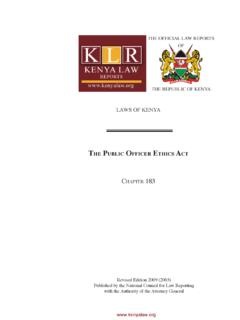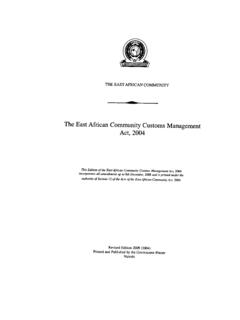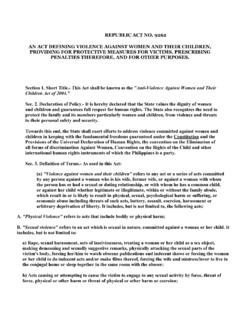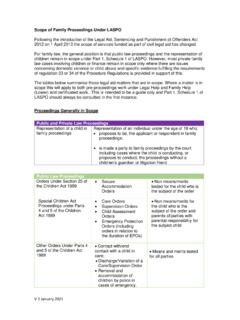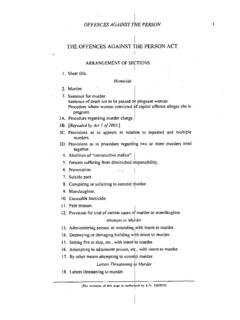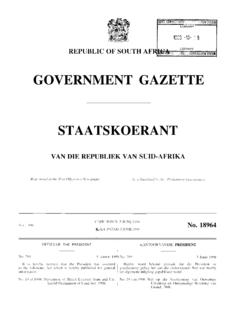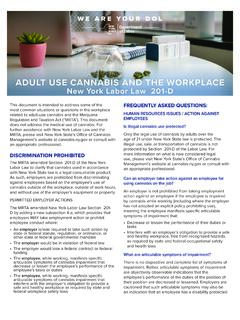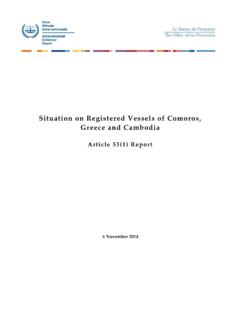Transcription of LABOUR RELATIONS ACT - Kenya Law Reports
1 LAWS OF Kenya LABOUR RELATIONS ACT No. 14 of 2007 Revised Edition 2012 [2007] Published by the National Council for Law Reporting with the Authority of the Attorney-General [Rev. 2012] No. 14 of 2007 LABOUR RELATIONS 3 [Issue 1] NO. 14 OF 2007 LABOUR RELATIONS ACT ARRANGEMENT OF SECTIONS PART I PRELIMINARY Section 1. Short title. 2. Interpretation. 3. Application. PART II FREEDOM OF ASSOCIATION 4. Employee s right to freedom of association. 5. Protection of employees. 6. Employer s right to freedom of association. 7. Protection of employers rights. 8. Rights of trade unions, employers organisations and federations. 9. Provision may not be varied by agreement. 10. Disputes under Part.
2 11. Burden of proof. PART III ESTABLISHMENT AND REGISTRATION OF TRADE UNIONS AND EMPLOYERS ORGANISATIONS 12. Establishing a trade union or employers organisation. 13. Application to register a trade union or employers organisation. 14. Requirements for registering a trade union. 15. Requirements for registering employers organisation. 16. Requirements for registering federation of trade unions. 17. Requirements for registering a federation of employers. 18. Application for registration. 19. Registration of trade union, employers organisation or federation. 20. Refusal to register a trade union, employers organisation or federation. 21. Effect of registration. 22. Objects in restraint of trade not unlawful.
3 23. Consequences of failure to register. 24. Registered office. 25. Registration of branches. 26. Amalgamation of trade unions, employers organisations or federations. 27. Change of name or constitution of trade union, employers organisation or federation. 28. Cancellation or suspension of registration. 29. Notice of dissolution. 30. Appeals against decision of Registrar. No. 14 of 2007 [Rev. 2012] LABOUR RELATIONS [Issue 1] 4 PART IV OFFICIALS AND MEMBERS OF TRADE UNIONS AND EMPLOYERS ORGANISATIONS Section 31. Officials. 32. Membership of minors. 33. Voting members of trade union. 34. Election of officials. 35. Notification of officials. PART V PROPERTY, FUNDS AND ACCOUNTS OF TRADE UNIONS, EMPLOYERS ORGANISATIONS AND FEDERATIONS 36.
4 Trustees. 37. Property to be vested in trustees. 38. Devolution of property. 39. Application of funds. 40. Prohibition of payment of fines or penalties. 41. Injunction to restrain misuse of funds. 42. Treasurer to render accounts. 43. Annual returns. 44. Inspection of accounts and records. 45. Obstructing inspection by Registrar. 46. Power to require detailed accounts. 47. Misuse of money or property of a trade union. PART VI TRADE UNION DUES, AGENCY FEES AND EMPLOYERS ORGANISATION FEES 48. Deduction of trade union dues. 49. Deduction of agency fees from unionisable employees covered by collectiveagreements. 50. General provisions applicable to deductions. 51.
5 Collection of levies other than trade union dues. 52. Direct payment of trade union dues. 53. Payments by members to employers organisations. PART VII RECOGNITION OF TRADE UNIONS AND COLLECTIVE AGREEMENTS 54. Recognition of trade union by employer. 55. Election of trade union representatives. 56. Trade union access to employer s premises. 57. Collective agreements. 58. Alternative dispute resolution. 59. Effect of collective agreements. 60. Registration of collective agreement. 61. Terms and conditions of service in the public sector where there is no collectivebargaining. [Rev. 2012] No. 14 of 2007 LABOUR RELATIONS 5 [Issue 1] PART VIII DISPUTE RESOLUTION Section 62.
6 Reporting of trade disputes to the Minister. 63. Respondent may file replying statement. 64. Interested party may file statement of interest. 65. Minister to appoint conciliators. 66. Persons appointed to conciliate. 67. Conciliator s powers to resolve dispute. 68. Dispute resolved after conciliation. 69. Dispute unresolved after conciliation. 70. Minister may appoint conciliator in public interest. 71. Committee of inquiry. 72. Exercise of powers of the Minister. PART IX ADJUDICATION OF DISPUTES 73. Referral of dispute to Industrial Court. 74. Urgent referrals to Industrial Court. 75. Arbitration Act does not apply. PART X STRIKES AND LOCK-OUTS 76. Protected strikes and lock-outs.
7 77. Powers of Industrial Court. 78. Prohibited strikes or lock-outs. 79. Strike or lock-out in compliance with this Act. 80. Strike or lock-out not in compliance with this Act. 81. Essential services. PART XI MISCELLANEOUS PROVISIONS 82. General penalty. 83. Regulations. 84. Repeal of Cap. 233 and Cap. 234. SCHEDULES FIRST SCHEDULE MATTERS FOR WHICH PROVISION MUST BE MADE IN THE CONSTITUTION OF TRADE UNION OR EMPLOYERS ORGANISATION SECOND SCHEDULE FORMS THIRD SCHEDULE FORMS FOURTH SCHEDULE ESSENTIAL SERVICES FIFTH SCHEDULE TRANSITIONAL PROVISIONS [Rev. 2012] No. 14 of 2007 LABOUR RELATIONS 7 [Issue 1] NO. 14 OF 2007 LABOUR RELATIONS ACT [Date of assent: 22nd October, 2007.]
8 ] [Date of commencement: 26th October, 2007.] An Act of Parliament to consolidate the law relating to trade unions and trade disputes, to provide for the registration, regulation, management and democratisation of trade unions and employers organisations or federations, to promote sound LABOUR RELATIONS through the protection and promotion of freedom of association, the encouragement of effective collective bargaining and promotion of orderly and expeditious dispute settlement, conducive to social justice and economic development and for connected purposes [Act No. 15 of 2008.] PART I PRELIMINARY 1. Short title This Act may be cited as the LABOUR RELATIONS Act, 2007.
9 2. Interpretation In this Act, unless the context otherwise requires authorised representative means (a) the general secretary of a trade union; (b) an employer or the chief executive officer of an employer; (c) the secretary of a group of employers; (d) the chief executive or association secretary of an employers organisation; or (e) any person appointed in writing by an authorised representative to perform the functions of the authorised representative; award means an award made by the Industrial Court; Board means the National LABOUR Board; collective agreement means a written agreement concerning any terms and conditions of employment made between a trade union and an employer, group of employers or organisation of employers; Committee of Inquiry means a Committee of Inquiry appointed by the Minister to inquire into any matter relevant to a trade dispute; contract of service means any agreement, whether oral or in writing, expressed or implied, to employ or to serve as an employee in return for remuneration, and includes contract of apprenticeship and indentured learnership; conciliation means the act or process of conciliating; No.
10 14 of 2007 [Rev. 2012] LABOUR RELATIONS [Issue 1] 8 contract of apprenticeship and learnership means a contract of service where there is (a) an obligation on the employer to take all reasonable steps to ensure that the employee is taught, and acquires the knowledge and skills of that industry, by means of practical training received in the cause of the employee s training and employment; and (b) a provision for formal recognition of the fact that the employee has acquired the knowledge and skills intended to be acquired where the employee has done so; employee means a person employed for wages or a salary and includes an apprentice and an indentured learner; employer means any person, public body, firm, corporation or company, who or which has entered into a contract of service to employ any individual, and includes the agent, foreman, manager or factor of such person, public body, firm, corporation or company; employers organisation means any number of employers associated together for the purpose, whether by itself or with other purposes, of regulating RELATIONS between employers and their employees or the trade unions representing those employees; employment matter means a matter concerning any terms or conditions of, or affecting, employment.
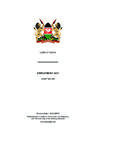


![^Wi t! T. r 'L.7-1'..] - Kenya Law: Home Page](/cache/preview/9/9/c/1/3/4/6/5/thumb-99c134659d99cdad6f2ed119d86ccdc5.jpg)

